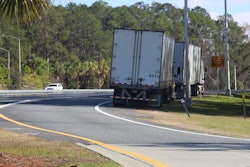Trucking news and briefs for Monday, March 1, 2021:
Safety groups' legal challenge of HOS changes on hold until April
A petition challenging the hours of service regulations that took effect at the end of September 2020 is on hold after a court granted a request by the Federal Motor Carrier Safety Administration to hold the case in abeyance.
The lawsuit was filed in the U.S. Court of Appeals for the District of Columbia Circuit by the Advocates for Highway and Auto Safety, the International Brotherhood of Teamsters, Citizens for Reliable and Safe Highways, and Parents Against Tired Truckers. The group asked the court to review the changes to the hours of service, calling the rule “arbitrary, capricious or otherwise contrary to law,” and challenged FMCSA’s authority to issue the rule.
Earlier this month, FMCSA filed a motion to pause the case to give the new leadership within the agency time to “become familiar with the issues and determine how they wish to proceed,” the request states.
The court granted the motion, putting the case on hold for 60 days until April 20.
ATA, truck stops, more ask CDC to designate truck stops as mobile COVID vaccine sites
Several trucking groups and truck stop association NATSO are urging the Centers for Disease Control to designate truck stops and travel plazas as mobile COVID vaccination sites to leverage existing truck stop locations for the distribution of vaccines to professional truck drivers and truck stop employees.
In a letter to CDC Director Rochelle Walensky, the groups said the very nature of the trucking, truck stop and travel plaza industries allows a unique opportunity to have an immediate and meaningful impact on the distribution of vaccines to essential truck drivers and truck stop employees.
Utilizing truck stops and travel plazas as mobile vaccination sites would alleviate significant challenges that truckers currently face in receiving an expedient vaccine, the groups said. Many states, for example, currently require proof of residency to receive a vaccine, the letter noted.
The groups said drivers should be allowed to receive a vaccine in a state other than that within which they reside due to their length of time on the road and away from home. “Truck drivers also should be allowed to receive their second vaccination at a different truck stop location, as it is improbable that they would have the ability to return to the primary vaccination site on a specific date or time," the letter added.
“By administering vaccines through our nationwide network of locations, we can ensure the ability of our employees and the nation’s truck drivers to continue serving on the front lines of the fuel and food distribution systems across the country,” the organizations said in the letter. “Furthermore, by vaccinating truck stop employees, we can amplify the breadth and scope of vaccination deployment across the communities in which we operate. It is imperative that we protect those who are delivering critical supplies – including the vaccine – throughout the country. Allowing the truck stop industry, which provides the parking and other services drivers need on the road, to serve as mobile vaccination sites is the best way to meet this goal.”
NATSO was joined in signing the letter by the American Trucking Associations, National Association of Small Trucking Companies, National Private Truck Council, National Tank Truck Carriers, Truckload Carriers Association and the St. Christopher Truckers Relief Fund.
Navistar recalls 27k International trucks; Paccar, Daimler issue smaller recalls
Three recalls announced last week by Navistar, Paccar and Daimler Trucks North America affect more than 27,000 trucks, according to National Highway Traffic Safety Administration documents.
The largest of the three recalls came from Navistar, which affects approximately 27,457 trucks, was prompted by the battery ground cable ring terminal at the frame connecting point possibly breaking, resulting in a loss of electrical power and unintended engine shutdown without warning.
The Navistar recall includes model year 2018-2021 International LoneStar trucks and model year 2017-2021 International LT tractors.
Navistar will notify owners, and dealers will replace the battery ground cable for free. Owners can contact Navistar customer service at 1-800-448-7825 with recall number 21501. NHTSA’s recall number is 21V-079.
A recall from Paccar affects approximately 132 trucks equipped with Cummins X15 engines. In the affected trucks, the capscrews that attach the flywheel to the crankshaft may have been improperly torqued, allowing the flywheel to detach, which could cause loss of drive power. Affected models include:
- 2021-2022 Kenworth T680
- 2021-2022 Kenworth T800
- 2021-2022 Kenworth T880
- 2021-2022 Kenworth W900
- 2021-2022 Kenworth W990
- 2021-2022 Peterbilt 367
- 2021-2022 Peterbilt 389
- 2021-2022 Peterbilt 567
- 2021-2022 Peterbilt 579
Paccar will notify owners, and dealers will properly torque the capscrews and inspect for possible damage and, if necessary, repair any damage found. Owners can contact Paccar customer service at 1-425-828-5888 (Kenworth) or 1-940-591-4220 (Peterbilt). with recall numbers 21KWA and 21PBB. NHTSA’s recall number is 21V-080.
Finally, Daimler is recalling just seven model year 2021-2022 Freightliner Cascadia trucks equipped with Cummins X15 engines with the same flywheel issue as Paccar’s recall.
DTNA will work with the engine manufacturer Cummins to notify owners, and Cummins dealers will properly torque the capscrews and inspect for possible damage and, if necessary, repair any damage found. Owners can contact DTNA customer service at 1-800-547-0712 with recall number FL-875. NTHSA’s recall number is 21V-073.












